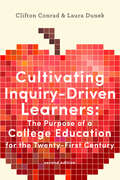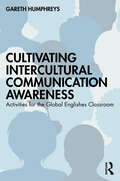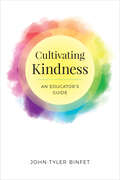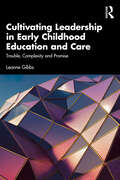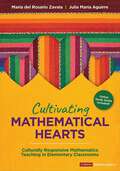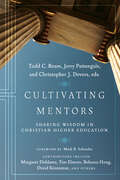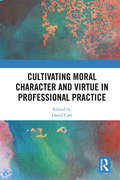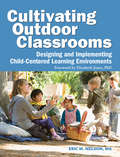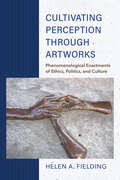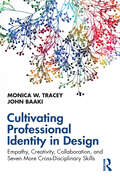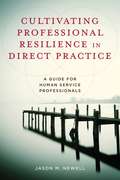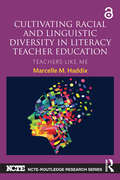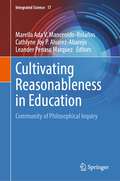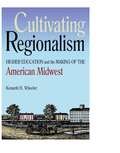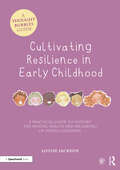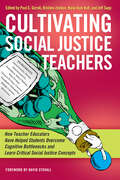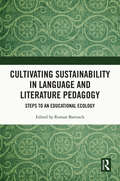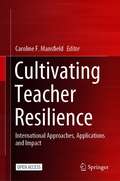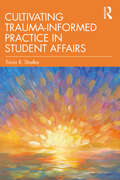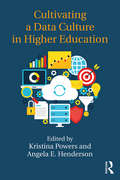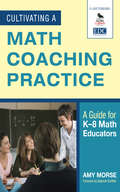- Table View
- List View
Cultivating Humanity
by Martha C. NussbaumHow can higher education today create a community of critical thinkers and searchers for truth that transcends the boundaries of class, gender, and nation? Martha C. Nussbaum, philosopher and classicist, argues that contemporary curricular reform is already producing such "citizens of the world" in its advocacy of diverse forms of cross-cultural studies. Her vigorous defense of "the new education" is rooted in Seneca's ideal of the citizen who scrutinizes tradition critically and who respects the ability to reason wherever it is found--in rich or poor, native or foreigner, female or male. Drawing on Socrates and the Stoics, Nussbaum establishes three core values of liberal education--critical self-examination, the ideal of the world citizen, and the development of the narrative imagination. Then, taking us into classrooms and campuses across the nation, including prominent research universities, small independent colleges, and religious institutions, she shows how these values are (and in some instances are not) being embodied in particular courses. She defends such burgeoning subject areas as gender, minority, and gay studies against charges of moral relativism and low standards, and underscores their dynamic and fundamental contribution to critical reasoning and world citizenship. For Nussbaum, liberal education is alive and well on American campuses in the late twentieth century. It is not only viable, promising, and constructive, but it is essential to a democratic society. Taking up the challenge of conservative critics of academe, she argues persuasively that sustained reform in the aim and content of liberal education is the most vital and invigorating force in higher education today.
Cultivating Inquiry-Driven Learners: The Purpose of a College Education for the Twenty-First Century
by Clifton Conrad Laura DunekHow can colleges develop learners who pursue innovative ideas that enable them to flourish and contribute in a rapidly changing world?Two decades into the twenty-first century, our nation's colleges and universities no longer embrace a clear and convincing definition of the purpose of a college education. Instead, most institutions have fallen prey to a default purpose in which college is essentially workforce preparation for jobs that already exist, while students are viewed as commodities instead of being educated to flourish throughout their lives. But rather than bemoan the diminishing legacy of liberal education, this new edition of Cultivating Inquiry-Driven Learners argues that the time has come to advance a pioneering purpose of college that guides the undergraduate experience from program requirements to teaching and learning.This purpose, Clifton Conrad and Laura Dunek write, is anchored in the premise that the world in which we live is one in which change—environmental, cultural, economic, political—is a constant driving force. The authors envision a college-educated person in the twenty-first century as an "inquiry-driven learner": a person equipped with the capabilities to explore and cultivate ideas that will prepare them to successfully navigate constant change, capitalize on career opportunities, enrich their personal life, and contribute to the public good. They describe four signature capabilities that students must develop in order to innovate and adapt: core qualities of mind, critical thinking skills, expertise in divergent modes of inquiry, and the capacity to express and communicate ideas.Guided by this trailblazing vision, Conrad and Dunek have thoroughly revised every chapter of the book to reflect current scholarship and emerging trends. In an expanded conclusion, they provide a cornucopia of ideas for replenishing undergraduate education accompanied by real-world examples of innovative programs and practices from colleges and universities across the United States. Throughout, Cultivating Inquiry-Driven Learners challenges stakeholders from across higher learning—faculty, students, staff, administrators, and policymakers—to reflect on the purpose of college, embrace innovation, and ensure that students are educated to thrive in and contribute to our constantly changing world.
Cultivating Intercultural Communication Awareness: Activities for the Global Englishes Classroom
by Gareth HumphreysIn an increasingly interconnected world, supporting students as they learn to communicate in linguistically diverse intercultural settings is a significant aim of English language and international education. To address this educational objective, this book breaks down the complexities associated with global English in intercultural communication and it challenges conventional educational focuses through activities that promote intercultural awareness and citizenship.The resource book offers pre-service teachers and educators a range of activities grounded in contemporary perspectives on Global Englishes, intercultural learning, and intercultural citizenship education. The book shifts the focus from teaching to imitate native-like proficiency by providing educators with practices and ideas to develop students who are globally aware, can handle complexities of communicating using English as a lingua franca (ELF), and can act as responsible intercultural citizens in a globalised society. Around 120 practical activities are presented for use in supplementing existing curricula or in the design of new learning programmes.This book is a key resource for pre-service teachers and educators involved in English language education, international education, and intercultural education, as well as for scholars and instructors of applied linguistics, TESOL preparation programmes, and teacher education programmes.
Cultivating Kindness: An Educator’s Guide
by John-Tyler BinfetCultivating Kindness sheds light on just how children and adolescents are kind, especially in school. Grounded in psychological and educational research on kindness and supported with illustrations capturing the voices of public school students, this book enhances our understanding of kindness. Written with educators in mind, Cultivating Kindness draws from surveys and interviews with more than three thousand children and adolescents. Author John-Tyler Binfet shares perspectives on kindness from the very individuals we hope will embrace kindness. Interwoven among examples from students are findings from peer-reviewed studies on topics exploring the role of joy and stress contagions on fostering or thwarting kindness, the concept of kind discipline, and how to measure kindness in school. This book also includes a kindness checklist to guide educators wishing to implement and foster kindness in their classrooms or schools. In addition to practical scenarios challenging the reader to respond kindly, a repository of kindness resources to support the continued kindness education of readers is also included.
Cultivating Leadership in Early Childhood Education and Care: Trouble, Complexity and Promise
by Leanne GibbsThis book redefines leadership in early childhood education (ECE), offering fresh theoretical insights and practical approaches.Delving into the challenges of the workforce in the ECE sector, this book unravels the narrative of leadership development. It underscores the importance of leadership practices in maintaining process quality within ECE, which significantly impacts children’s academic, emotional and social outcomes and life trajectories. The book presents novel conceptualisations of leadership, shedding light on factors that enable and constrain leadership development through the theoretical frameworks of complexity leadership theory and the theory of practice architectures. It also provides practical strategies for cultivating leadership within early childhood organisations. Through interviews and case studies, the book brings to life the experiences of ECE leaders, amplifying important themes and experiences.This book is an invaluable read for educators and leaders around the world, providing inspiration and guidance for their leadership journey. It is also an empirically based must-read for lecturers and students in the higher education sector.
Cultivating Mathematical Hearts: Culturally Responsive Mathematics Teaching in Elementary Classrooms (Corwin Mathematics Series)
by Maria del Zavala Julia Maria AguirreHelp students see their whole selves in the math they′re learning with culturally responsive teaching. Cultivating Mathematical Hearts: Culturally Responsive Mathematics Teaching in Elementary Classrooms, aims to re-center mathematics as a humanizing endeavor because putting children and their humanity at the heart of mathematics education can result in more engaged, meaningful, and joyful learning. This book introduces a model and a tool for Culturally Responsive Mathematics Teaching, constructed to create a safe, inclusive space where all learners can come together in their own educational journey and develop a love for math that centers their experiences and comes from the heart. Implementing the Culturally Responsive Mathematics Teaching Tool (CRMT2) will help you cultivate and sustain meaningful, rich, and rigorous mathematical learning spaces for all your students–experiences that foster mathematical curiosity and joy. The book walks you through each aspect of the framework and tool, guiding you to consider how your classroom structures, lessons, tasks, and assessments: Honor the existing cultural strengths, experiences, and lived realities of all your students Elicit diverse mathematical thinking and ideas Support equitable access to rigorous mathematical learning and discourse for all students Invite a sense of agency in each student’s learning experience Promote high engagement and excitement while learning mathematics Nurture an understanding that mathematics is a powerful tool for making sense of the world By weaving these strategies into classroom lessons, teachers can humanize mathematics instruction to successfully build a love for math while providing equitable learning opportunities that empower student voice and promote success in mathematics.
Cultivating Mathematical Hearts: Culturally Responsive Mathematics Teaching in Elementary Classrooms (Corwin Mathematics Series)
by Maria del Zavala Julia Maria AguirreHelp students see their whole selves in the math they′re learning with culturally responsive teaching. Cultivating Mathematical Hearts: Culturally Responsive Mathematics Teaching in Elementary Classrooms, aims to re-center mathematics as a humanizing endeavor because putting children and their humanity at the heart of mathematics education can result in more engaged, meaningful, and joyful learning. This book introduces a model and a tool for Culturally Responsive Mathematics Teaching, constructed to create a safe, inclusive space where all learners can come together in their own educational journey and develop a love for math that centers their experiences and comes from the heart. Implementing the Culturally Responsive Mathematics Teaching Tool (CRMT2) will help you cultivate and sustain meaningful, rich, and rigorous mathematical learning spaces for all your students–experiences that foster mathematical curiosity and joy. The book walks you through each aspect of the framework and tool, guiding you to consider how your classroom structures, lessons, tasks, and assessments: Honor the existing cultural strengths, experiences, and lived realities of all your students Elicit diverse mathematical thinking and ideas Support equitable access to rigorous mathematical learning and discourse for all students Invite a sense of agency in each student’s learning experience Promote high engagement and excitement while learning mathematics Nurture an understanding that mathematics is a powerful tool for making sense of the world By weaving these strategies into classroom lessons, teachers can humanize mathematics instruction to successfully build a love for math while providing equitable learning opportunities that empower student voice and promote success in mathematics.
Cultivating Mentors: Sharing Wisdom in Christian Higher Education
by Todd C. Ream Jerry Pattengale Christopher J. Devers Christopher J. Devers, Jerry Pattengale, Todd C. ReamMany colleges and universities informally highlight the value of mentoring among academic professionals.Cultivating MentorsDavid KinnamanTim ClydesdaleMargaret DiddamsEdgardo Colón-EmericRebecca C. HongTim ElmoreBeck A. TaylorStacy A. HammonsCultivating Mentors
Cultivating Moral Character and Virtue in Professional Practice (Routledge Research in Character and Virtue Education)
by David CarrCultivating Moral Character and Virtue in Professional Practice is a pioneering collection of essays focused on the place of character and virtue in professional practice. Professional practices usually have codes of conduct designed to ensure good conduct; but while such codes may be necessary and useful, they appear far from sufficient, since many recent public scandals in professional life seem to have been attributable to failures of personal moral character. This book argues that there is a pressing need to devote more attention in professional education to the cultivation or development of such moral qualities as integrity, courage, self-control, service and selflessness. Featuring contributions from distinguished leaders in the application of virtue ethics to professional practice, such as Sarah Banks, Ann Gallagher, Geoffrey Moore, Justin Oakley and Nancy Sherman, the volume looks beyond traditional professions to explore the ethical dimensions of a broad range of important professional practices. Inspired by a successful international and interdisciplinary conference on the topic, the book examines various ways of promoting moral character and virtue in professional life from the general ethical perspective of contemporary neo-Aristotelian virtue theory. The professional concerns of this work are of global significance and the book will be valuable reading for all working in contemporary professional practices. It will be of particular interest to academics, practitioners and postgraduate students in the fields of education, medicine, nursing, social work, business and commerce and military service.
Cultivating Outdoor Classrooms
by Eric NelsonCreate an outdoor learning programTransform outdoor spaces into learning environments where children can enjoy a full range of activities as they spend quality time in nature. This book is filled with guidance to help you plan, design, and create an outdoor learning program that is a rich, thoughtfully equipped, natural extension of your indoor curriculum. Loaded with practical and creative ideas, it also includes information to help youUnderstand how outdoor classrooms benefits children's learning and developmentCollaborate with other teachers, administrators, and families to make your outdoor classroom a realityCreate development and action plans to strategize and implement changesEvaluate your outdoor environment, program, and practices Cultivating Outdoor Classrooms promotes the idea that if you can do it indoors, you can probably do it outside as well.Eric Nelson is the founder and director of Child Care Planning Associates, the consulting and training division of the Child Educational Center, Caltech/JPL Community, which he established with his wife in 1979. Eric's consulting specialties include building and playground design and renovation, child care needs assessment and feasibility studies, development of employer-related child care, and staff training and development. Eric's understanding of the value of the outdoors is grounded in a lifetime of hiking his beloved Sierra Nevada Mountains in California since he was a young child.
Cultivating Perception through Artworks: Phenomenological Enactments of Ethics, Politics, and Culture
by Helen A. FieldingWhat are the ethical, political and cultural consequences of forgetting how to trust our senses? How can artworks help us see, sense, think, and interact in ways that are outside of the systems of convention and order that frame so much of our lives? In Cultivating Perception through Artworks, Helen Fielding challenges us to think alongside and according to artworks, cultivating a perception of what is really there and being expressed by them.Drawing from and expanding on the work of philosophers such as Luce Irigaray and Maurice Merleau-Ponty, Fielding urges us to trust our senses and engage relationally with works of art in the here and now rather than distancing and systematizing them as aesthetic objects. Cultivating Perception through Artworks examines examples as diverse as a Rembrandt painting, M. NourbeSe Philip's poetry, and Louise Bourgeois' public sculpture, to demonstrate how artworks enact ethics, politics, or culture. By engaging with different art forms and discovering the unique way that each opens us to the world in a new and unexpected ways, Fielding reveals the importance of our moral, political, and cultural lives.
Cultivating Professional Identity in Design: Empathy, Creativity, Collaboration, and Seven More Cross-Disciplinary Skills
by Monica W. Tracey John BaakiCultivating Professional Identity in Design is a nuanced, comprehensive companion for designers across disciplines honing their identities, self-perception, personal strengths, and essential attributes. Designers’ identities, whether rooted in education, workforce training, digital technology, arts and graphics, built environment, or other fields, are always evolving, influenced by any combination of current mindset, concrete responsibilities, team dynamics, and more. Applicable to designers of all contexts, this inspiring yet rigorous book guides practitioners and students to progress with ten key traits: empathy, uncertainty, creativity, ethics, diversity/equity/inclusion, reflection, learning, communication, collaboration, and decision-making. Though it details a complete journey from start to finish, this book acknowledges the varying paths of designers’ roles and is structured for a flexible, highly iterative reading experience. Segments can be read individually or out of order and revisited for new insights. Current and future stages of development – education experience, early-career opportunities, mid-career accomplishments, and/or career transitions – are factored in without hierarchy. Specific takeaways, activities, and reflection exercises are intended to work across settings and levels of experience. Design hopefuls and experts alike will find a new way to participate in and persevere through their work.
Cultivating Professional Identity in Design: Empathy, Creativity, Collaboration, and Seven More Cross-Disciplinary Skills
by Monica W. Tracey John BaakiCultivating Professional Identity in Design is a nuanced, comprehensive companion for designers across disciplines honing their identities, self-perception, personal strengths, and essential attributes. Designers’ identities, whether rooted in education, workforce training, digital technology, arts and graphics, built environment, or other fields, are always evolving, influenced by any combination of current mindset, concrete responsibilities, team dynamics, and more. Applicable to designers of all contexts, this inspiring yet rigorous book guides practitioners and students to progress with ten key traits: empathy, uncertainty, creativity, ethics, diversity/equity/inclusion, reflection, learning, communication, collaboration, and decision-making.Though it details a complete journey from start to finish, this book acknowledges the varying paths of designers’ roles and is structured for a flexible, highly iterative reading experience. Segments can be read individually or out of order and revisited for new insights. Current and future stages of development – education experience, early-career opportunities, mid-career accomplishments, and/or career transitions – are factored in without hierarchy. Specific takeaways, activities, and reflection exercises are intended to work across settings and levels of experience. Design hopefuls and experts alike will find a new way to participate in and persevere through their work.
Cultivating Professional Resilience in Direct Practice: A Guide for Human Service Professionals
by Jason M. NewellOverwhelming empirical evidence indicates that new social workers, particularly those going into child welfare or other trauma-related care, will discover emotional challenges including the indirect or secondary effects of the trauma work itself, professional burnout, and compassion fatigue. However, the newly revised CSWE Educational Policy and Accreditation Standards (EPAS) does not mandate the inclusion of content related to self-care in social work curriculum or field education. In a textbook that bridges the gap between theoretical and pragmatic approaches to this important issue in human service work, Jason M. Newell provides a potential resolution by conceptualizing self-care as an ongoing and holistic set of practice behaviors described as the key to professional resilience.To address the effects of trauma-related care on direct practitioners, Newell provides a comprehensive, competency-based model for professional resilience, examining four key constructs—stress, empathy, resilience, and self-care—from a range of theoretical dimensions. For those who work with vulnerable populations, the tendency to frame self-care solely within organizational context overlooks the importance of self-care in domains beyond the agency setting. Alternatively, he uses a framework grounded in the ecological-systems perspective conceptualizing self-care as a broader set of practice behaviors pertaining to the whole person, including the physical, interpersonal, organizational, familial, and spiritual domains of the psychosocial self. Alongside professional self-care practices at the organizational level, Newell makes a case for the pragmatic role of recreational activities, time with family and friends, physical health, spirituality, and mindfulness. The application of a comprehensive approach to self-care practice has potential to empower practitioners to remain resilient and committed to the values, mission, and spirit of the social work profession in the face of trauma.
Cultivating Racial and Linguistic Diversity in Literacy Teacher Education: Teachers Like Me (NCTE-Routledge Research Series)
by Marcelle M. HaddixCultivating Racial and Linguistic Diversity in Literacy Teacher Education examines how English and literacy teacher education—a space dominated by White, English-monolingual, middle class perspectives—shapes the experiences of preservice teachers of color and their construction of a teacher identity. Significant and timely, this book focuses attention on the unique needs and perspectives of racially and linguistically diverse preservice teachers in the field of literacy and English education and offers ways to improve teacher training to better meet the needs of preservice teachers from all racial, ethnic, and linguistic backgrounds. These changes have the potential to diversify the teacher force and cultivate teachers who bring rich racial, cultural, and linguistic histories to the field of teaching.
Cultivating Racial and Linguistic Diversity in Literacy Teacher Education: Teachers Like Me (NCTE-Routledge Research Series)
by Marcelle M. HaddixCultivating Racial and Linguistic Diversity in Literacy Teacher Education examines how English and literacy teacher education—a space dominated by White, English-monolingual, middle class perspectives—shapes the experiences of preservice teachers of color and their construction of a teacher identity.Significant and timely, this book focuses attention on the unique needs and perspectives of racially and linguistically diverse preservice teachers in the field of literacy and English education and offers ways to improve teacher training to better meet the needs of preservice teachers from all racial, ethnic, and linguistic backgrounds. These changes have the potential to diversify the teacher force and cultivate teachers who bring rich racial, cultural, and linguistic histories to the field of teaching.Chapters 1, 2, and 3 of this book are freely available as downloadable Open Access PDFs at http://www.taylorfrancis.com under a Creative Commons Attribution-Non Commercial-No Derivatives (CC-BY-NC-ND) 4.0 license.
Cultivating Reasonableness in Education: Community of Philosophical Inquiry (Integrated Science #17)
by Marella Ada V. Mancenido-Bolaños Cathlyne Joy P. Alvarez-Abarejo Leander Penaso MarquezThis book focuses on the real-world application of the Philosophy for/with Children (P4wC) pedagogy to cultivate reasonableness in individuals through communities of philosophical inquiry. It presents a collection not only of theories but, more importantly, of experiences, discoveries, and innovations on P4wC by scholars, trainers, advocates, and practitioners around the world. Each chapter provides readers with insights and lessons that have resulted from the continuous application, exploration, and enrichment of the concepts, principles, and practices that were developed by Matthew Lipman and Ann Margaret Sharp into what P4wC is today - a dialogic pedagogical approach that may just be what is needed at a time when reasonableness and dialogue are essential to maintaining global stability and progress. In this light, this book also looks into how the P4wC approach can be practiced with adults such as when it is employed in various settings or contexts such as in business consulting, textbook writing, peace education, and extremism prevention, among others. Furthermore, this book also features chapters that discuss how the P4wC pedagogy can be beneficial once integrated into processes such as classroom teaching, teacher education, bioethics, and employee education. This book provides valuable insights about how reasonableness that is cultivated through building communities of philosophical inquiry in education can be a powerful tool for nation-building and social transformation.
Cultivating Regionalism: Higher Education and the Making of the American Midwest
by Kenneth WheelerIn this ambitious book, Kenneth Wheeler revises our understanding of the nineteenth-century American Midwest by reconsidering an institution that was pivotal in its making—the small college. During the antebellum decades, Americans built a remarkable number of colleges in the Midwest that would help cultivate their regional identity. Through higher education, the values of people living north and west of the Ohio River formed the basis of a new Midwestern culture. Cultivating Regionalism shows how college founders built robust institutions of higher learning in this socially and ethnically diverse milieu. Contrary to conventional wisdom, these colleges were much different than their counterparts in the East and South—not derivative of them as many historians suggest. Manual labor programs, for instance, nurtured a Midwestern zeal for connecting mind and body. And the coeducation of men and women at these schools exploded gender norms throughout the region. Students emerging from these colleges would ultimately shape the ethos of the Progressive era and in large numbers take up scientific investigation as an expression of their egalitarian, production-oriented training. More than a history of these antebellum schools, this elegantly conceived work exposes the interplay in regionalism between thought and action—who antebellum Midwesterners imagined they were and how they built their colleges in distinct ways.
Cultivating Resilience in Early Childhood: A Practical Guide to Support the Mental Health and Wellbeing of Young Children (Thought Bubbles)
by Louise JacksonWritten to support the use of the Thought Bubbles picture books, this guidebook has been created to help teachers and practitioners initiate ‘nurturing conversations’ and cultivate resilience in young children. Early identification of mental health and wellbeing needs by those who spend the most time with the children is key to offering the support vulnerable children need. This series takes a proactive approach to mental health support, creating a culture of trust and resilience long before crisis point is reached. Based on the author’s extensive research and wealth of experience, this guidebook will help start the conversation, showing the reader what to do and say early on in a child’s life, to help influence the way that they experience the world in the future. This book: Offers practical, low-cost actions that can be easily adapted to suit different environments and contexts. Explores key topics such as effective listening, communication, relationships and environments. Is designed to facilitate the effective use of the four Thought Bubbles picture books, supporting the practitioner to elicit nurturing conversations. Designed to be used in a range of childcare settings, this book is an essential resource for all those who care for and educate young children.
Cultivating Social Justice Teachers: How Teacher Educators Have Helped Students Overcome Cognitive Bottlenecks and Learn Critical Social Justice Concepts
by Paul C. Gorski Kristien Zenkov Jeff Sapp Nana Osei-KofiFrustrated by the challenge of opening teacher education students to a genuine understanding of the social justice concepts vital for creating an equitable learning environment?Do your students ever resist accepting that lesbian, gay, bisexual, transgender, or queer people experience bias or oppression, or that their experiences even belong in a conversation about “diversity,” “multiculturalism,” or “social justice?”Recognizing these are common experiences for teacher educators, the contributors to this book present their struggles and achievements in developing approaches that have successfully guided students to complex understandings of such threshold concepts as White privilege, homophobia, and heteronormativity, overcoming the “bottlenecks” that impede progress toward bigger learning goals and understandings. The authors initiate a conversation – one largely absent in the social justice education literature and the discourse – about the common content- and pedagogy-related challenges that social justice educators face in their work, particularly for those doing this work in relative or literal isolation, where collegial understanding cannot be found down the hall or around the corner. In doing so they hope not only to help individual teachers in their practice, but also strengthen social justice teacher education more systemically. Each contributor identifies a learning bottleneck related to one or two specific threshold concepts that they have struggled to help their students learn. Each chapter is a narrative about individual efforts toward sometimes profound pedagogical adjustment, about ambiguity and cognitive dissonance and resistance, about trial and error, and about how these educators found ways to facilitate foundational social justice learning among a diversity of education students. Although this is not intended to be a “how-to” manual, or to provide five easy steps to enable straight students to “get” heteronormativity, each chapter does describe practical strategies that teachers might adapt as part of their own practice.
Cultivating Sustainability in Language and Literature Pedagogy: Steps to an Educational Ecology
by Roman BartoschThis book introduces the notion of ‘educational ecology’ as a necessary and promising pedagogic principle for the teaching of Anglophone literatures and cultures in a time of climate change. Drawing on scholarship in the environmental humanities and practice-oriented research in education and literature pedagogy, chapters address the challenges of climate change and the demand for sustainability and environmental pedagogy from the specific perspective of literary and cultural studies and education, arguing that these perspectives constitute a crucial element of the transdisciplinary effort of ‘cultivating sustainability.’ The notion of an ‘educational ecology’ takes full advantage of the necessarily dialogic and co-constitutive nature of sustainability-related pedagogical philosophy and practice while it retains the subject-specific focus of research and education in the humanities, centring on and excelling in critical thinking, perspective diversity, language and discourse awareness, and the literary and cultural constructions of meaning. This book will be of great interest to academics, researchers and post-graduate students in the fields of language, literature and culture pedagogy, as well as transdisciplinary researchers in the environmental humanities.
Cultivating Teacher Resilience: International Approaches, Applications and Impact
by Caroline F. MansfieldThis open access book follows the development of the Building Resilience in Teacher Education (BRiTE) project across Australia and internationally. Drawing on the success of this project and the related research collaborations that have since emerged, it highlights the importance of cultivating resilience at various stages of teachers’ careers.Divided into three sections, the book includes conceptual, empirical and applied chapters, designed to introduce readers to the field of research, provide empirical evidence and showcase innovative applications. The respective chapters illustrate the ways in which teacher resilience can be enhanced in a variety of contexts, and address specific learning activities, case studies, resources and strategies, student feedback and applied outcomes. They also consider future directions including cross-cultural applications and the use of technologies such as augmented reality. The book will appeal to researchers, teacher educators and teachers, as well as those interested in supporting the cultivation and ongoing development of professional resilience for pre-service and practicing teachers.
Cultivating Trauma-Informed Practice in Student Affairs
by Tricia R. ShalkaOffering a multi-tiered approach to supporting college students who have experienced trauma, this book considers how trauma manifests for post-secondary college students and how colleges and universities can implement trauma-informed practice in student affairs. Author Tricia R. Shalka offers knowledge about trauma and its trajectories to help ground trauma-informed practice, before translating this knowledge into specific strategies that span a spectrum of individual and systems-level efforts in colleges and universities. The story of college student trauma is presented through several different lenses, including discussions around the research literature, what the author’s research participants offer, and the author’s own personal experience with trauma. Drawing on these diverse perspectives, Shalka initiates a journey of reflection and (re)connection that will ultimately inform an understanding of the challenges college student trauma survivors encounter and what it means to embrace trauma-informed approaches in student affairs supportive of student success and well-being-centric organizations. Written in an approachable and conversational style, this book introduces new concepts to consider when working toward building a trauma-informed practice in student affairs and as such will assist student affairs practitioners, university administrators, and college-level educators in supporting students.
Cultivating a Data Culture in Higher Education
by Kristina Powers Angela E. HendersonHigher education institutions have experienced a sharp increase in demand for accountability. To meet the growing demand by legislators, accreditors, consumers, taxpayers, and parents for evidence of successful outcomes, this important book provides higher education leaders and practitioners with actionable strategies for developing a comprehensive data culture throughout the entire institution. Exploring key considerations necessary for the development of an effective data culture in colleges and universities, this volume brings together diverse voices and perspectives, including institutional researchers, senior academic leaders, and faculty. Each chapter focuses on a critical element of managing or influencing a data culture, approaches for breaking through common challenges, and concludes with practical, research-based implementation strategies. Collectively, these strategies form a comprehensive list of recommendations for developing a data culture and becoming a change agent within your higher education institution.
Cultivating a Math Coaching Practice: A Guide for K-8 Math Educators
by Amy MorseThis resource offers math activities, planning activities, and a facilitator's guide for developing mathematics leaders' coaching practice and knowledge of math teaching and learning.

